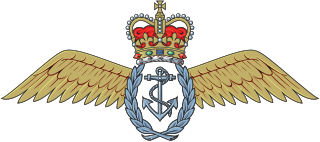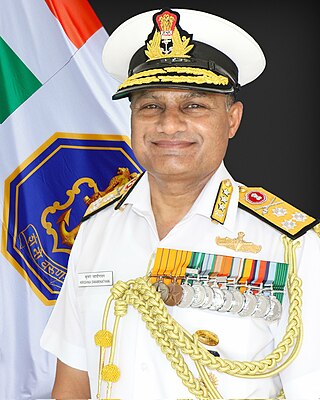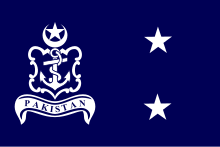
The Royal Navy (RN) is the naval warfare force of the United Kingdom, British Overseas Territories and Crown Dependencies, and a component of His Majesty's Naval Service. Although warships were used by English and Scottish kings from the early medieval period, the first major maritime engagements were fought in the Hundred Years' War against France. The modern Royal Navy traces its origins to the English Navy of the early 16th century; the oldest of the UK's armed services, it is consequently known as the Senior Service.

The Fleet Air Arm (FAA) is the naval aviation component of the United Kingdom's Royal Navy (RN). The FAA is one of five RN fighting arms. As of 2023 it is a primarily helicopter force, though also operating the F-35 Lightning II carrier-based stealth fighter jointly with the Royal Air Force.

RFA Black Rover was a Rover-class small fleet tanker of the Royal Fleet Auxiliary (RFA). She was designed to replenish ships underway at sea with fuel, fresh water, and stores in all weather conditions. She had a helicopter deck served by a stores lift and was capable of conducting helicopter replenishment. Displacing 16,160 tonnes, she was powered by twin diesels and has a ship's company of 60.

The Indian Navy is the maritime branch of the Indian Armed Forces. The President of India is the Supreme Commander of the Indian Navy. The Chief of Naval Staff, a four-star admiral, commands the navy. As a blue-water navy, it operates significantly in the Persian Gulf Region, the Horn of Africa, the Strait of Malacca, and routinely conducts anti-piracy operations and partners with other navies in the region. It also conducts routine two to three month-long deployments in the South and East China seas as well as in the western Mediterranean sea simultaneously.

Standing Royal Navy deployments is a list of operations and commitments undertaken by the United Kingdom's Royal Navy on a worldwide basis. The following list details these commitments and deployments sorted by region and in alphabetical order. Routine deployments made by the Navy's nuclear-powered submarines and their location of operations is classified.

The Pakistan Navy (PN) is the naval warfare branch of the Pakistan Armed Forces. The Chief of the Naval Staff, a four-star admiral, commands the navy and is a member of the Joint Chiefs of Staff Committee. The Pakistan Navy operates on the coastline of Pakistan in the Arabian Sea and Gulf of Oman. It was established in August 1947, following the creation of Pakistan.

Admiral Sir Jonathon Band is a retired Royal Navy officer who was the First Sea Lord and Chief of the Naval Staff from 2006 to 2009. Before serving as First Sea Lord he was Commander-in-Chief Fleet. Since becoming First Sea Lord, Band had been a firm advocate of the creation of new ships to meet new threats and maintain the status of the Royal Navy as one of the world's leading naval forces.

The Fleet Operational Standards and Training (FOST) is a Royal Navy training organisation. FOST is the training organisation responsible for ensuring that Royal Navy and Royal Fleet Auxiliary vessels are fit to join the operational fleet.
Rear Admiral Philip Lawrence Wilcocks, was a British senior Royal Navy officer who served as Rear Admiral Surface Ships.

The Navy Command is the current headquarters body of the Royal Navy, and as of 2012 its major organisational grouping. It is a hybrid, neither a command, nor simply an installation. Royal Navy official writings describe Navy Command Headquarters both as a physical site, on Whale Island, Hampshire, a collective formed of the most senior RN officers, and as a budgetary grouping.

A Thursday War is the colloquial name given in the Royal Navy for the weekly war-fighting and damage control exercises that are held during Fleet Operational Sea Training (FOST), so named because they are usually held on a Thursday. FOST is responsible for ensuring that Royal Navy and Royal Fleet Auxiliary vessels are fit to join the operational fleet by testing vessels' readiness through a series of drills and exercises. These culminate in the so-called 'Thursday War', war-fighting scenarios designed to test a ship's company's reaction to various situations and emergencies.

The Fleet Commander is a senior Royal Navy post, responsible for the operation, resourcing and training of the ships, submarines and aircraft, and personnel, of the Naval Service. The Vice-Admiral incumbent is required to provide ships, submarines and aircraft ready for operations, and is based at Navy Command Headquarters.

The Assistant Chief of the Naval Staff (Aviation, Amphibious Capability & Carriers) formerly the Assistant Chief of the Naval Staff (Aviation and Carrier Strike) is a senior Royal Navy appointment responsible for naval aviation. The post is also the successor to the Royal Navy's Flag Officer for naval aviation in the British Isles, established since 1939.

The Eastern Fleet is a Naval fleet of the Indian Navy. It is known as the 'Sword Arm' of the Eastern Naval Command and called the Sunrise Fleet. It is headquartered at Visakhapatnam, Andhra Pradesh on the east coast of India. It is a part of the Eastern Naval Command and is responsible for the naval forces in the Bay of Bengal and parts of the Indian Ocean.

Vice Admiral Krishna Swaminathan, AVSM, VSM is a serving Flag officer in the Indian Navy. He currently serves as the Vice Chief of Naval Staff. He took over as the 39th Vice Chief of Naval staff on 1 May 2024. He previously served as Chief of Personnel. He earlier served as the Controller of Personnel Services, Chief of Staff of the Western Naval Command, Flag Officer Defence Advisory Group (FODAG), Flag Officer Commanding Western Fleet (FOCWF) and Flag Officer Sea Training (FOST). He was the second Commanding Officer of the aircraft carrier INS Vikramaditya.

Vice Admiral Sanjay Jasjit Singh, AVSM, NM is a serving flag officer in the Indian Navy. He currently serves as the Flag Officer Commanding-in-Chief Western Naval Command. He previously served as the 37th Vice Chief of the Naval Staff and as the Deputy Chief of Integrated Defence Staff (Operations) at IDS HQ.
Flag Officer Sea Training (FOST) may refer to:

The Flag Officer Sea Training (FOST) is a training organisation in the Indian Navy. FOST is the authority responsible for the operational sea training of all personnel of Indian Naval and Coast Guard ships and submarines. The organisation was instituted in 1992 and is the common authority to maintain battle efficiency standards. It also provides training to navies and maritime security forces of friendly foreign countries (FFC). Headquartered in Kochi, the FOST operates under the control of the Flag Officer Commanding-in-Chief Southern Naval Command.

Commander Pakistan Fleet (COMPAK) is a formal title in the Pakistan Navy to denote the head of Pakistan Fleet Command. The role is responsible for fleet support, progressive transition of the fleet, and the effectiveness of the force. The COMPAK is also assigned with responsibilities to oversee combat and staff capabilities of the fleet such as deployment of the forces, in addition to ensure equipment capacities designed to improve "operational readiness".














